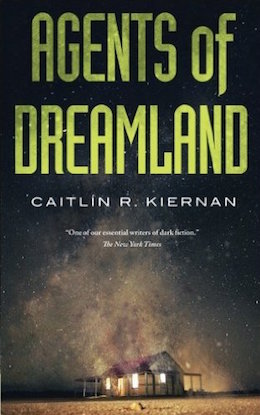There are pieces on the board: the Signalman, an agent for a blackbudget American service; a cult ranch-house at the Salton Sea that houses horrors from another world; a lost film about an alien princess; a timeless and frightening agent from another service with her own motivations; the New Horizons probe skating past the orbit of Pluto and encountering something alien. These singular events and people all feed into the start—or end—of something immense and devastating for the human species.
I have been continually impressed with the Tor.com novella imprint, as it offers a unique and necessary venue for quality long-form fiction that doesn’t exist elsewhere—and Agents of Dreamland is no exception to that rule. The novella form allows Kiernan to construct a discomfiting narrative that skips like a stone across water, sketching out a brief but provocative landscape of fright and inevitability for our planet up against Lovecraftian cosmic horrors. It’s long enough to develop intense investment but short enough to leave unanswered and unanswerable questions about the future it implies.
As you might have gathered from that description, Agents of Dreamland is not a comfortable or comforting read—and that’s quite refreshing. The mix of noir and horror tropes, here, makes for a claustrophobic and unnerving reading experience. I also thought that I’d seen enough usage of the cordyceps fungus as a device that it wouldn’t get my skin crawling anymore, but I was thoroughly wrong about that. There’s something to be said for the technique Kiernan has in rendering physically gruesome and frightful biology—I could use not thinking the phrase “fruiting body” in terms of human skin again, but damn is it effective.
The structure of the novella asks the reader to do a reasonable amount of contextual work, too, which is something I appreciate. Half of the significant action of the narrative occurs offscreen, and the other half is related by unreliable or under-informed points of view—so, the reader has to pay close attention to the people involved in the vignette-style chapters that link together to create the story. In a sense, we’re given a set of puzzle pieces and expected to put them together. I’d argue that this makes the unspoken and unseen horrors of the piece even more effective, more disturbing. This is particularly true of Sexton’s few chapters, where she slips through time and ultimately reveals that the future—as it comes from the now—is a future in which the invaders from another world have taken our planet.
On some level, given how used to the genre conventions I am, it was a shock to hit that point: the realization that there would be no hail-mary from the grizzled protagonist or his agency, and that despite the cult’s plan going slightly awry because of Chloe’s actions, the spores would still spread and the human species would still fall. The events that the Signalman observes and assists with just bought us a bit more time, rather than stealing success from the jaws of defeat. It’s harsh and it’s clever, and it worked all the better for having made me pay attention and work for it—making those connections between events spread over one hundred years, skipped across and sketched out for us, as if we too are the Signalman trying to determine the answers for questions he can hardly name. The final chapter, “Lowdown Subterranean End-Times Blues (Revisited),” wraps this up for us without wrapping things much at all, saying:
“The haunted human psyche craves resolution. […] humans, inherent problem solvers that we are, chafe at problems that cannot be solved, questions that cannot ever, once and for all, satisfactorily be put to rest. […] In his heart of hearts, the Signalman knows this is gospel. But his job is, all the same, to pursue answers for the Powers That Be, the powerbrokers, the gatekeepers. And in the absence of answers, he’s learned to settle for the doubtful consolation of necessary fictions.”
As I said: it isn’t comforting, but it’s so very good. (And there’s that phrase again, “necessary fictions,” echoing up from The Red Tree and The Drowning Girl: A Memoir.)
And on that note, Agents of Dreamland is also intriguing for me on another front: it is the first new book of Kiernan’s I’ve held in hand since the Siobhan Quinn trilogy, the satirical urban fantasy project that followed the (utterly brilliant) duet of The Red Tree and The Drowning Girl: A Memoir. It feels, considered against that landscape, like a homecoming of sorts. This novella is cosmic in scope, close to bereft of hope, and full of intense, often-grotesque-but-poetic body horror; it’s disturbing and colorful and rich. The prose is to die for, bouncing between three points of view, each of which is myopic in its own unique way.
It’s treading familiar ground, especially for fans of Kiernan, but doing so with the kind of panache and skill that makes it a distinct pleasure rather than a predictable experience. Agents of Dreamland fits in with her bibliography but also, given the context, feels something like a return to form—pleasurable for the writer and the audience both. I very much enjoyed reading it, and it left me thinking about all of the connections and implications Kiernan constructed between the characters, the world, and the reader.
Agents of Dreamland is classic Kiernan, and I recommend it thoroughly.
Agents of Dreamland is available now from Tor.com Publishing.
Read an excerpt on Tor.com.
Lee Mandelo is a writer, critic, and editor whose primary fields of interest are speculative fiction and queer literature, especially when the two coincide. They have two books out, Beyond Binary: Genderqueer and Sexually Fluid Speculative Fiction and We Wuz Pushed: On Joanna Russ and Radical Truth-telling, and in the past have edited for publications like Strange Horizons Magazine. Other work has been featured in magazines such as Stone Telling, Clarkesworld, Apex, and Ideomancer.










